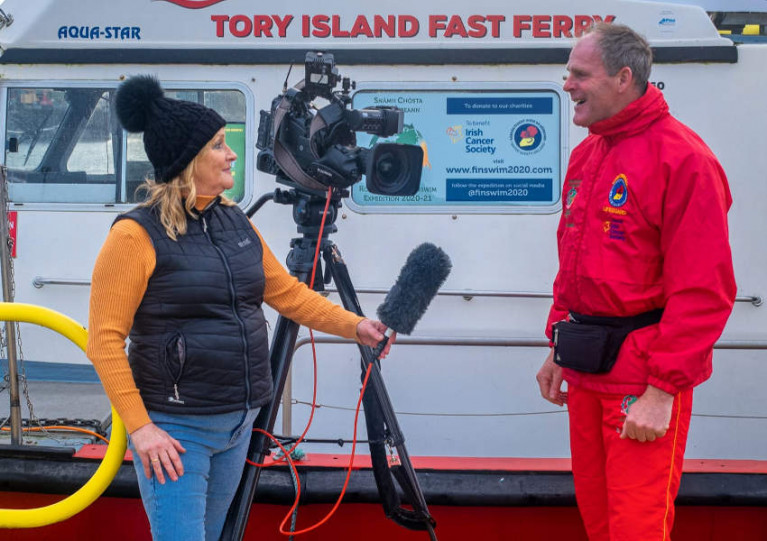Displaying items by tag: Henry O’Donnell
Renowned swimmer Henry O’Donnell is set to bring his 1500km, round Ireland Finswim to a close. In doing so he will become the first person to circumnavigate the island of Ireland by swimming with the use of fins.
The expedition is expected to conclude at Henry’s native Carrickfinn in County Donegal, where he first set off on his journey around Ireland on September 17th 2020.
O’Donnell has undertaken the challenge to raise much-needed funds for national charities Water Safety Ireland and the Irish Cancer Society, and to date has raised over €46,000. Henry has been a keen advocate for both charities, as he delivered safety talks to children and the public throughout his swim.
Listen into O’Donnell talking to Lorna Siggins about his round Ireland Finswim on podcast here
Henry O’Donnell On Last Leg of Solo Fin Swim Around Ireland
Donegal-born former Army Ranger, lifeguard, diver and swim instructor Henry O'Donnell broke his neck during the bicycle section of a triathlon 30 years ago, but hasn't looked back since his recovery.
Anrí Ó Dómhnaill, a father and grandfather, has trekked and climbed to some of the highest and lowest points on four of the globe's continents and led the first successful relay swim around Ireland in 2006.
 Former Army Ranger Henry O'Donnell has previously completed a relay swim round Ireland Photo: Rory O'Donnell
Former Army Ranger Henry O'Donnell has previously completed a relay swim round Ireland Photo: Rory O'Donnell
O'Donnell set out in September 2020 from Carrickfin beach in the Donegal gaeltacht - where he first learned to swim - with the aim of completing the first solo fin swim around Ireland in aid of two charities, Water Safety Ireland and the Irish Cancer Society.
 O'Donnell set out in September 2020 from Carrickfin beach in the Donegal gaeltacht from where he was born and raised Photo: Rory O'Donnell
O'Donnell set out in September 2020 from Carrickfin beach in the Donegal gaeltacht from where he was born and raised Photo: Rory O'Donnell
He had to take a pause last year due to Covid, but he and his team are back in the water and on the last long leg up the west coast. By early February 2022, he had raised over €45,000 for the two charities.
 O'Donnell has progressed round Ireland in a clockwise direction due to the prevailing south-westerly winds Photo: Rory O'Donnell
O'Donnell has progressed round Ireland in a clockwise direction due to the prevailing south-westerly winds Photo: Rory O'Donnell
O'Donnell spoke to Wavelengths in Galway about the planning and logistics, reliance on team and community support, the marine life he has encountered, jellyfish stings, and how he copes with the low days.
The webpage link on his project, showing the tracker with his current location, and with details on how to donate is here
 The solo fin swimmer faced very strong tides in the Northern Channel between Northern Ireland and Scotland Photo: Rory O'Donnell
The solo fin swimmer faced very strong tides in the Northern Channel between Northern Ireland and Scotland Photo: Rory O'Donnell
A Donegal swimmer’s epic challenge to circumnavigate the island of Ireland will feature on RTÉ Nationwide tonight, Wednesday 6 January.
As reported in October on Afloat.ie, Henry O’Donnell has been donning his fins and taking to the water — as pandemic restrictions allow — to swim clockwise around the coast.
Starting west of Gweedore last September, the experienced expeditionist has now made it in stages as far as Kilmore Quay in Co Wexford, and incredible achievement in its own right.
The RTÉ Nationwide crew caught up with him in November off the coast of Wicklow as he put in the work to help raise funds for Water Safety Ireland and the Irish Cancer Society.
Tune in from 7pm this evening on RTÉ One or catch up later on the RTÉ Player.





























































